Click on pics for full view.
Stewart: Peter Yang; Hair: Kylee Heath at the Wall Group; Makeup: Jillian Dempsey using Chanel Le Volume Mascara at Starworks Artists; Styling: Tara Swennen at the Wall Group; Dress: Reem Acra; Jewelry; Chanel; Location: The Hollywood Roosevelt Hotel.
Stewart: Peter Yang; Hair: Kylee Heath at the Wall Group; Makeup: Jillian Dempsey using Chanel Le Volume Mascara at Starworks Artists; Styling: Tara Swennen at the Wall Group; Dress: Reem Acra; Jewelry; Chanel; Location: The Hollywood Roosevelt Hotel.
Kristen Stewart arrives at a French restaurant in Los Feliz without an entourage — no publicist, no bodyguard. She’s incognito, with a hat pulled low on her head, hands in her pockets, bare arms dressed with tattoos. Looking like any other hipster, she greets the waiter with a mellow “What’s up, dude?” (“dude” and “f—k” are her two favorite words) and orders a glass of champagne with a cup of ice. As she reflects on her life, she takes periodic sips, letting the cubes, one by one, melt into the fizz.
At only 26, Stewart is in the middle of reinventing her career. After catapulting to fame at 17 in the young-adult vampire franchise “Twilight,” she couldn’t leave her house without flashbulbs trailing her every step. The public became obsessed with her relationship with her then-boyfriend (and co-star) Robert Pattinson, and she topped every studio’s wish list for it-girl parts. But since putting Bella Swan to rest in 2012, she’s turned her back on tentpoles. Instead, she’s been choosing character roles — such as the daughter in “Still Alice,” and a celebrity-assistant in Olivier Assayas’ “Clouds of Sils Maria,” which won her the César last year.
“I didn’t carve out some path,” Stewart says of her post-“Twilight” years. “I didn’t fight hard to be taken seriously. As much as the ‘Twilight’ series shaped and defined me for other people in a grand way, for me it wasn’t something I had to get away from. It was just a long experience on a movie that I liked.”
The five blockbusters based on Stephenie Meyer’s books grossed $3.3 billion worldwide, but also destroyed Stewart’s privacy. She was the patient zero of Internet celebrities — the first young female movie star to headline a film franchise in the 24-hour TMZ cycle. “Everyone I’ve met already knows me,” she says. “It’s weird.”
In 2012, when photos surfaced of her kissing married director Rupert Sanders following the release of “Snow White and the Huntsman,” she issued a public apology — an excruciating moment for an actress usually so quiet about her personal life. Stewart, who refers to the incident obliquely as “the scandal,” believes that society relishes tearing women down.
“Women are so judgmental of each other,” she says. “It’s very innate, instinctive, f—ed-up, animal-like.” But the spotlight hasn’t discouraged her from acting. “It was something that was a nuisance,” Stewart says of the downsides to fame. “How do you resent me if you’ve actually never met me?”
After taking 18 months off following the release of the final “Twilight” film in 2012 — “it was such overexposure,” she says — Stewart returned with a vengeance to making movies. Her résumé is now loaded with edgy and experimental indie titles, and she’s racked up frequent-flier miles by traveling to film festivals. She kicked off 2016 at Sundance with Kelly Reichardt’s “Certain Women,” in which she plays an adult-school teacher who has a bittersweet relationship with a student (Lily Gladstone). She’s the lead in Drake Doremus’ “Equals,” a dystopian love story that debuted at Venice and will open in theaters July 15. She just finished a pivotal role as the sister of a conflicted Iraq war hero in Ang Lee’s “Billy Lynn’s Long Halftime Walk,” which debuts in the fall.
And she has two movies at this week’s Cannes Film Festival: Woody Allen’s opening-night comedy “Café Society,” where she portrays an Audrey Hepburn-like 1930s secretary; and Assayas’ “Personal Shopper,” an eerie ghost story in which she appears in every scene. “She was playing what I wrote, but taking it to another dimension,” Assayas says. “That’s the most exciting thing you can witness.”
Stewart grew up in Los Angeles, and got the acting bug from her family. Her mom, Jules Mann-Stewart, had a career as a script supervisor. Her dad, John Stewart, is a stage manager who worked on this year’s Oscars pre-show. After the eighth grade, when her movie career picked up, she stopped going to public school in favor of home-schooling.
“Her parents are just regular movie people,” says Jodie Foster, who starred with an 11-year-old Stewart in “Panic Room. “That was Kristen’s approach to acting; it was a job.” Even then, Foster saw a familiar quality in Stewart. “I know this sounds like I love myself so much,” Foster says. “But she really reminded me of myself as a child. She had all the joy of being a kid, but it was really like being with an adult.”
Stewart has heard people call her guarded. She admits she’s still nervous on red carpets, which is why she sometimes looks miserable when walking them. “The amount of tumultuous growing up I’ve had to do in front of everyone is awesome,” she says. “For somebody who is super-sensitive and cagey, it’s the perfect place for me to be thrust into, because I’m like, ‘Oh my f—ing God. Now I have to live in a f—ing bounce house and stand and say, “‘No, I deserve to be here.” ’ ”
She has fond memories of making the original “Twilight,” the movie that changed her life. But she concedes that the sequels had to be churned out quickly. “The next ones, we were trying to satisfy something that was less specific,” Stewart says. “There was a fear that drove why we were there. There wasn’t a cohesiveness. I think they ended up OK, because there was still individual passion. They are a little splattered against the wall — but they are trying.”
She did make one studio tentpole after “Twilight”: 2012’s “Snow White and the Huntsman,” which grossed almost $400 million globally. But when it came time to do the sequel, Universal didn’t invite her back. In retrospect, she’s glad. Last month’s “The Huntsman: Winter’s War” was an origins tale headlined by Chris Hemsworth that tanked at the box office. “I read a few scripts,” Stewart recalls. “None of them were good. None of them were greenlight-able. And I had a meeting with Universal about the places where the story could go. Maybe Chris was more into it. I actually don’t f—ing know.”
She insists that the tabloid coverage of her relationship with Sanders didn’t factor into Universal’s decision-making. “It wasn’t a situation where I got kicked off a movie because I got in trouble,” she says. “We had been in talks months after that about making something work, and it never came together.”
Stewart found out about the sequel in a press release. “I was like, ‘OK, cool,’ ” she says with a laugh. “We hadn’t spoken in a long time, but I didn’t know we had broken up.” The studio did reach out to ask if she would appear in a cameo as Snow White. She told them, “I might just leave that be. I was really into that, but — ” she adds with a smirk. “So now I’m like … ‘Thank God.’ ” (Universal declined to comment.)
Despite her indie streak, Stewart isn’t opposed to returning to blockbusters. “I’m a kid from the Valley,” she says. “I love big movies that everyone sees, and I can’t wait for the opportunity to f—ing nail that. It has to be the right people and the right time.”
“Café Society” is the first role since “Twilight” for which Stewart had to audition. She thought she’d botched her cold read, because the part is a stretch. “I have a sort of heavy energy, and she’s truly the opposite of that,” Stewart says, referring to the character she portrays on screen. The movie, set in the 1930s, focuses on two men — a Hollywood agent (Steve Carell) and his nephew (Jesse Eisenberg) — who compete for the affections of a beautiful office secretary (Stewart).
Allen wasn’t interested in coddling his star. In fact, he mocked the way she carried herself between takes. “I told her she walked like a relief pitcher coming in from the bullpen,” Allen says. But on camera, Stewart nailed the lightness of her character, and projects a winning vulnerability. “If this was 1944 or 1935, she would have been one of those drop-dead-beautiful movie stars,” says Allen, who skipped “Twilight,” instead discovering Stewart in the 2009 indie “Adventureland.” “She would have been in the pantheon of classic actresses like Rita Hayworth or Elizabeth Taylor.”
Stewart has her own stories to tell about working with Allen. “He’s so shticky,” she says. “He knows how to do an impression of himself and finds it funny.” After an eight-hour day would wrap, she adds, “he was always asking us what we did after work,” as if expecting a secret answer. She received two notes from the director: “That felt fake” and “Speed it up, I’m falling asleep.” But in the end, he used the slower takes. “He tries to convince you he’s completely unaware,” Stewart says. “You’re like, ‘F—k, are we making the one un-Woody Allen Woody Allen movie?’ But ultimately, I think we made one that was very much back to his quintessential style.”
Stewart admits that initially she had concerns about working with Allen. She was aware of the sexual-abuse allegations of his daughter, Dylan Farrow, who wrote an open letter to The New York Times in 2014, condemning actresses like Emma Stone and Scarlett Johansson for supporting his work. After she was cast, Stewart had a conversation with Eisenberg about the situation.
“I was like, ‘What do you think? We don’t know any of these people involved. I can personalize situations, which would be very wrong.’ At the end of the day, Jesse and I talked about this. If we were persecuted for the amount of shit that’s been said about us that’s not true, our lives would be over,” Stewart says. “The experience of making the movie was so outside of that, it was fruitful for the two of us to go on with it.”
Eisenberg says he doesn’t recall the conversation, but he’s impressed by the way Stewart has handled her fame. “If I were to become president of the United States, I would only have an inkling of the scrutiny that she experiences,” he says. “I have the exact same three people interested in me; I’m related to them. She has helicopters following her.”
Stewart’s philosophy about her personal life has been to deflect questions about her romantic interests. “When I was dating a guy, I would never talk about my relationships to anyone,” she says. “I feel the same way now.” She doesn’t use the word “girlfriend,” though she’s been photographed in public with women she’s reportedly dated. “I’m not hiding shit,” she says. “And I’m very obviously …” She leaves the last word of that sentence in ellipses.
Stewart says she’s inspired by the way young people view love without labels. “There’s acceptance that’s become really rampant and cool,” she says. “You don’t have to immediately know how to define yourself.” Stewart didn’t feel that way growing up, but she’s come to adopt this outlook. “I had to have some answer about who I was. I felt this weird responsibility, because I didn’t want to seem fearful. But nothing seemed appropriate. So I was like, ‘F—k, how do I define that?’ I’m not going to. Plus, I didn’t want to f—k with other people,” she says, referring to teenagers who struggle with their sexuality. “I didn’t want to be this example: It’s so easy. I don’t want it to seem like it was stupid for them to have a hard time.”
She says she wants to be a proponent for the LBGT community. “I find the movement that’s occurring to be so important, that I want to be part of it,” she says, without using the word “gay.” (When asked to confirm if that’s what she means, she jokes with a Variety reporter: “Like, say it so [you] can print it?”) “Me not defining it right now is the whole basis of what I’m about,” she says. “If you don’t get it, I don’t have time for you.”
She’s made the decision to appear in public with girlfriends — in front of the paparazzi — because she’s comfortable with the images being published. “That’s really important to me,” she says of young fans seeing them. “As much as I want to protect myself, it’s not about hiding. As soon as you start throwing up so many walls, you cannot see over them yourself, so you just start isolating in a way that’s not honest. I definitely found where I’m comfortable. I don’t take credit for that.” She says that times have changed, and her publicist doesn’t even need to ask her how she’ll handle these questions. “Things have really shifted in this wonderful way. I’m reaping the benefits.”
This will be Stewart’s third trip to the South of France, where she is adored by fans and the press. She first went to Cannes with 2012’s “On the Road” and returned with “Clouds of Sils Maria” two years later. She recalls attending the César Awards, not fully knowing what they were. “It’s a really f—ing big deal,” she says. Unlike the Oscars, there were no time limits for acceptance speeches, so the show dragged on for more than four hours. It was also all in French, a language Stewart doesn’t speak.
She’d been warned by her co-star, Juliette Binoche, that she’d never be called up to the stage — but she became the first American actress to take the prize. She had made a contingency plan for a speech. “If I won, then I’d go up there and say, ‘Sorry, I don’t speak French’ in French and thank Olivier and Juliette, which I think I did. Maybe?” The awards didn’t end until after 1 a.m., because of all the long-winded thank-yous. “I got to a f—ing dinner at 3 in the morning,” she says. “I was falling asleep.”
After Cannes, Stewart will finally have some time to rest. She’s not taking another acting job until she directs a short film that she wrote a few years ago — a nonlinear story with just one actor. Like Foster, she envisions a career for herself as a director.
“I grew up on a movie set, and before I was an actor, I wanted so badly to be part of this feeling, where everybody was protecting this treasure,” she says. “Everybody would do stupid shit and work too many hours and sacrifice their lives to discover something. I felt that protection, and I know the possibility that it exists. I want to be responsible for it so badly.”
Source


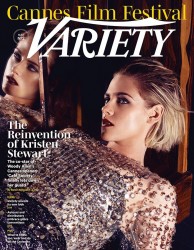
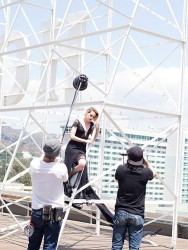
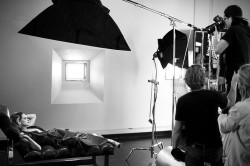
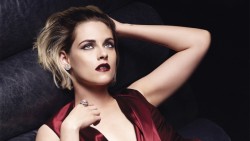
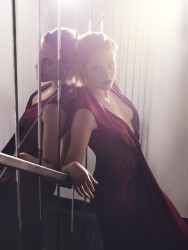
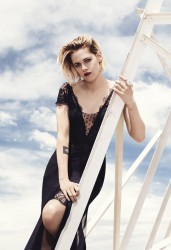
No comments:
Post a Comment
What do you think of this?